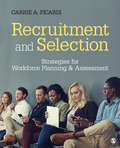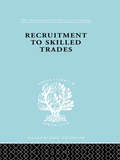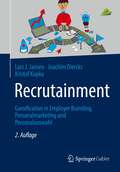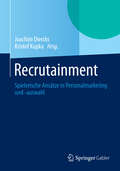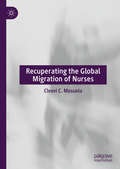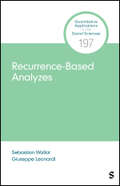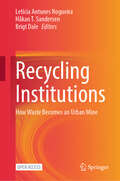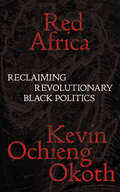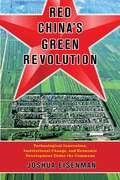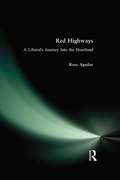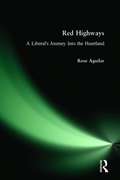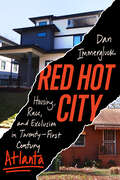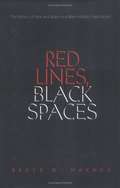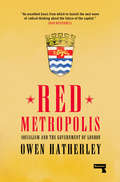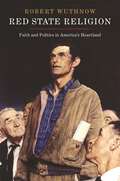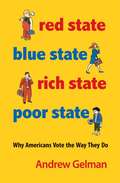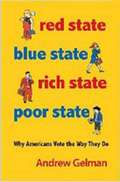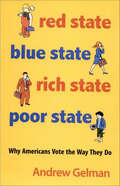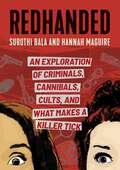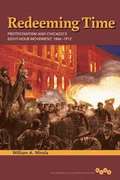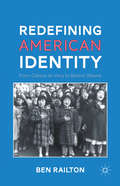- Table View
- List View
Recruitment and Selection: Strategies for Workforce Planning & Assessment
by Carrie A. PicardiThe workforce is changing and talent management is more important than ever. Recruitment and Selection: Strategies for Workforce Planning & Assessment unpacks best practices for designing, implementing, and evaluating strategies for hiring the right people. Using a proven job analysis framework, author Carrie A. Picardi uses her academic and industry experience to teach students how to assess candidates in an accurate, legal, and ethical manner. With clarity and relevance, this book truly bridges theory and concept with practice in an engaging manner and will benefit students who need to hit the ground running to successfully manage workforce needs and activities in a myriad professional settings.
Recruitment and Selection: Strategies for Workforce Planning & Assessment
by Carrie A. PicardiThe workforce is changing and talent management is more important than ever. Recruitment and Selection: Strategies for Workforce Planning & Assessment unpacks best practices for designing, implementing, and evaluating strategies for hiring the right people. Using a proven job analysis framework, author Carrie A. Picardi uses her academic and industry experience to teach students how to assess candidates in an accurate, legal, and ethical manner. With clarity and relevance, this book truly bridges theory and concept with practice in an engaging manner and will benefit students who need to hit the ground running to successfully manage workforce needs and activities in a myriad professional settings.
Recruitment to Skilled Trades (International Library of Sociology)
by Gertrude WilliamsFirst published in 1998. Routledge is an imprint of Taylor & Francis, an informa company.
Recrutainment: Gamification in Employer Branding, Personalmarketing und Personalauswahl
by Joachim Diercks Kristof Kupka Lars J. JansenRecrutainment hat sich in den letzten Jahren zu einem deutlich sichtbaren und allgemein akzeptierten Instrument in der Personalgewinnung entwickelt: Immer mehr Organisationen setzen auf spielerisch-simulative Elemente in Berufsorientierung, Employer Branding, Personalmarketing und Recruiting. Recrutainment ist die Gamification der Personalgewinnung.Self-Assessments, unterhaltsam und spielerisch-informativ gestaltete Online-Assessments, Berufsorientierungsspiele oder auch Offline-Recrutainment-Events verbessern nachweislich das stimmige Zusammenfinden von Kandidat und Arbeitgeber und versprechen so nicht nur eine optimale Stellenbesetzung, sondern stärken auch das Profil der Arbeitgebermarke.Diese zweite Auflage unter dem Titel Recrutainment ist kein Herausgeber-, sondern ein vollständig neu entwickeltes Autorenwerk. Die wissenschaftliche Basis von Recrutainment wird umfassend herausgearbeitet sowie die Ergebnisse empirischer Forschung vorgestellt. Zahlreiche Praxisbeispiele zeigen verschiedene Facetten von Recrutainment und die vielfältigen Einsatzmöglichkeiten in der Unternehmenspraxis. Das Buch richtet sich sowohl an HR-Praktikerinnen und -Praktiker als auch an Studierende, die die Grundlagen der psychologischen Personalauswahl und des Personalmarketings kennenlernen möchten. Der InhaltPersonalgewinnung, -marketing und -auswahlRecrutainment – die Gamification des RecruitingsOffline-Recrutainment – Vom Event vor Ort bis zum Blended-RecrutainmentSelf-Assessments – Online-Recrutainment in der SelbstauswahlOnline-Assessments – Online-Recrutainment in der Fremdauswahl
Recrutainment: Spielerische Ansätze in Personalmarketing und -auswahl
by Joachim Diercks and Kristof KupkaUm gute Mitarbeiter zu finden, reichen die üblichen Wege im Recruiting längst nicht mehr aus: Immer mehr Organisationen setzen auf Recrutainment, also den Einsatz spielerisch-simulativer Elemente in Berufsorientierung, Employer Branding, Personalmarketing und Recruiting.Self-Assessments, unterhaltsam und informativ gestaltete Online-Assessments, Berufsorientierungsspiele oder auch Offline-Recrutainment-Events verbessern nachweislich das stimmige Zusammenfinden von Kandidat und Arbeitgeber und versprechen so nicht nur eine optimale Stellenbesetzung, sondern stärken auch das Profil der Arbeitgebermarke. Das Buch liefert das theoretische Fundament für das Thema Recrutainment und erklärt, warum dessen Bedeutung in den letzten Jahren so stark zugenommen hat. Es werden die Auswirkungen von Recrutainment auf Organisationen und Bewerber unter Einbeziehung von aktuellen Studien beleuchtet. In ausgewählten Best Practice Beispielen stellen verschiedene Autoren dar, wie Recrutainment in der Unternehmenspraxis eingesetzt wird.
Recuperating The Global Migration of Nurses
by Cleovi C. MosuelaSitting at the nexus of labor migration and health care work, this book examines the dynamic relationship between nurses’ cross-border movement and efforts to regulate their migration. Grounded in multi-sited qualitative research, this volume analyzes the changing social dimensions and transnational scale of global nursing, focusing particularly on the recruitment from the Philippines to Germany. The flow of nursing skills from resource-poor countries to well-off ones is not only producing a global care crisis, but also serves as a prime example of the international race for talent and skill. As it takes a critical eye to the emerging field of migration governance or management as the preferred policy response to competing discourses of global care crises and the global competition for skilled care work, this book highlights not only the shifting web of actors, discourses, and practices in care work migration management, but also, and more importantly, how various forms of care figure in the global migration of nurses.
Recurrence-Based Analyses (Quantitative Applications in the Social Sciences)
by Giuseppe Leonardi Sebastian WallotThis book introduces techniques developed in physics and physiology for characterizing and analyzing patterns in time series data to a broad audience of social scientists. In contrast to time-series regression and related techniques, recurrence quantification analysis (RQA) has its background in chaos and nonlinear dynamical systems—theory arguably very relevant to social processes. The goal of Recurrence-Based Analyses is to introduce readers to these techniques that can characterize a system’s complexity, stability and instability, and conditions under which it transitions from one state to another. The authors illustrate concepts and techniques with relevant social science examples at different temporal scales: biweekly polling data on federal elections in Germany; daily values of three stock market indices; daily cases of SarsCov-19 in four countries during the pandemic; and second-by-second vocalizations of mothers and infants interacting recorded by motion cameras. This introduction to RQA serves as a useful supplement to undergraduate and graduate courses in computational social science, and also by researchers who seek new tools to address social scientific questions in new ways.
Recurrence-Based Analyses (Quantitative Applications in the Social Sciences)
by Giuseppe Leonardi Sebastian WallotThis book introduces techniques developed in physics and physiology for characterizing and analyzing patterns in time series data to a broad audience of social scientists. In contrast to time-series regression and related techniques, recurrence quantification analysis (RQA) has its background in chaos and nonlinear dynamical systems—theory arguably very relevant to social processes. The goal of Recurrence-Based Analyses is to introduce readers to these techniques that can characterize a system’s complexity, stability and instability, and conditions under which it transitions from one state to another. The authors illustrate concepts and techniques with relevant social science examples at different temporal scales: biweekly polling data on federal elections in Germany; daily values of three stock market indices; daily cases of SarsCov-19 in four countries during the pandemic; and second-by-second vocalizations of mothers and infants interacting recorded by motion cameras. This introduction to RQA serves as a useful supplement to undergraduate and graduate courses in computational social science, and also by researchers who seek new tools to address social scientific questions in new ways.
Recycling Institutions: How Waste Becomes an Urban Mine
by Brigt Dale Letícia Antunes Nogueira Håkan T. SandersenThis open access book investigates the phenomenon of recycling institutions in urban mining using social sciences lenses on the empirical context of waste from electrical and electronic equipment (WEEE), landfills as a potential resource pool and the recycling of building materials in Norway. There is a dual meaning to the term ‘recycling institutions’, and this book has the ambition to explore both. The first refers to institutions that recycle, i.e., the institutional infrastructure that facilitates material recycling. From household attitudes and practices to the laws and regulations that govern waste management, there is an institutional apparatus that recycling relies upon, which gains increased importance as the sustainability agenda develops. The second meaning refers to the recycling of institutions, in the sense that the institutional setup itself is being repurposed and transformed. This more metaphorical meaning points to the way in which emerging societal ambitions (such as the circular economy) stretch and bend existing institutions by imposing new functions upon them. Institutions are conservative and backward-looking and tend to resist rapid and radical changes that are incompatible with the ideas and practices they are built on. So, whereas the first is about designing new institutions for circularity, the second is about modifying and “recycling” existing institutions to meet the challenges circularity may entail. The central premise is that relevant, supportive and well-functioning institutional environments are crucial in the transition to a greener society that encourages industries, businesses, households and citizens to act in more sustainable ways, and it identify both possibilities and obstacles in the emergence of institutions that support urban mining. This book integrates a range of disciplines in the social sciences to investigate the phenomenon of recycling institutions. By examining the case of urban mining in Norway, with a special focus on how existing structures developed for waste management can be repurposed to facilitate this new function, the book provides insight into a scenario where material sourcing from anthropogenic sources is dissociated from natural resource scarcity and is instead linked to political ambitions and an attempt to stay at the forefront of sustainability transitions.
Red Africa: Reclaiming Revolutionary Black Politics (Salvage Editions)
by Kevin Ochieng OkothSalvaging a decolonised futureRed Africa makes the case for a revolutionary Black politics inspired by Marxist anti-colonial struggles in Africa. Kevin Ochieng Okoth revisits historical moments when Black radicalism was defined by international solidarity in the struggle against capitalist-imperialism, that together help us to navigate the complex histories of the Black radical tradition.He challenges common misconceptions about national liberation, showing that the horizon of national liberation was not limited to the nation-building projects of post-independence governments.While African socialists sought to distance themselves from Marxism and argued for a &‘third way&’ socialism rooted in &‘traditional African culture&’ the intellectual and political tradition Okoth calls &‘Red Africa&’ showed that Marxism and Black radicalism were never incompatible.The revolutionary Black politics of Eduardo Mondlane, Amílcar Cabral, Walter Rodney and Andrée Blouin gesture toward a decolonised future that never materialised. We might yet build something new from the ruins of national liberation, something which clings onto the utopian promise of freedom and refuses to let go. Red Africa is not simply an exercise in nostalgia, it is a political project that hopes to salvage what remains of this tradition—which has been betrayed, violently suppressed, or erased—and to build from it a Black revolutionary politics capable of imagining new futures out of the uncertain present.
Red China's Green Revolution: Technological Innovation, Institutional Change, and Economic Development Under the Commune
by Joshua EisenmanChina’s dismantling of the Mao-era rural commune system and return to individual household farming under Deng Xiaoping has been seen as a successful turn away from a misguided social experiment and a rejection of the disastrous policies that produced widespread famine. In this revisionist study, Joshua Eisenman marshals previously inaccessible data to overturn this narrative, showing that the commune modernized agriculture, increased productivity, and spurred an agricultural green revolution that laid the foundation for China’s future rapid growth.Red China’s Green Revolution tells the story of the commune’s origins, evolution, and downfall, demonstrating its role in China’s economic ascendance. After 1970, the commune emerged as a hybrid institution, including both collective and private elements, with a high degree of local control over economic decision but almost no say over political ones. It had an integrated agricultural research and extension system that promoted agricultural modernization and collectively owned local enterprises and small factories that spread rural industrialization. The commune transmitted Mao’s collectivist ideology and enforced collective isolation so it could overwork and underpay its households. Eisenman argues that the commune was eliminated not because it was unproductive, but because it was politically undesirable: it was the post-Mao leadership led by Deng Xiaoping—not rural residents—who chose to abandon the commune in order to consolidate their control over China. Based on detailed and systematic national, provincial, and county-level data, as well as interviews with agricultural experts and former commune members, Red China’s Green Revolution is a comprehensive historical and social scientific analysis that fundamentally challenges our understanding of recent Chinese economic history.
Red Highways: A Liberal's Journey Into the Heartland
by Rose AguilarTired of speaking to like-minded people, San Francisco blogger and radio journalist Rose Aguilar quit her job, bought a Toyota van, picked up her boyfriend, and took off on a six-month road trip through southern and mountain states. There she interviewed a wide array of people who rarely, if ever, appear in the national media. They include a former Republican evangelical pastor who now preaches inclusion in Tulsa; anti-war, pro-choice, and green Republicans; and a Montana hunter planning to leave his job as a conservationist to fight for gay rights.This political travelogue challenges stereotypes and goes far beyond the sound bites and statistics to reveal what red-state voters really care about—and what they expect from their political leaders.As Aguilar writes in the first chapter, “We breathe the same air, we live under the same political system, we’ve probably seen the same television and news shows, and most of us grew up going to public schools; yet because we might vote differently once every four years, we find ourselves stereotyped in the national media and separated by red and blue borders.”Red Highways is a riveting examination of what matters most in the heartland, what makes it tick, and what issues get its citizens to vote.
Red Highways: A Liberal's Journey into the Heartland
by Rose AguilarA San Francisco radio host grown tired of media stereotypes, Rose Aguilar packed up her van, picked up her boyfriend, and set out on a six-month road trip through the red-state West to find out what voters there really care about.
Red Hot City: Housing, Race, and Exclusion in Twenty-First-Century Atlanta
by Dan ImmergluckAn incisive examination of how growth-at-all-costs planning and policy have exacerbated inequality and racial division in Atlanta. Atlanta, the capital of the American South, is at the red-hot core of expansion, inequality, and political relevance. In recent decades, central Atlanta has experienced heavily racialized gentrification while the suburbs have become more diverse, with many affluent suburbs trying to push back against this diversity. Exploring the city’s past and future, Red Hot City tracks these racial and economic shifts and the politics and policies that produced them. Dan Immergluck documents the trends that are inverting Atlanta’s late-twentieth-century "poor-in-the-core" urban model. New emphasis on capital-driven growth has excluded low-income people and families of color from the city’s center, pushing them to distant suburbs far from mass transit, large public hospitals, and other essential services. Revealing critical lessons for leaders, activists, and residents in cities around the world, Immergluck considers how planners and policymakers can reverse recent trends to create more socially equitable cities.
Red Lines, Black Spaces: The Politics of Race and Space in a Black Middle-class Suburb
by Bruce D. HaynesRed Lines, Black Spaces is a case study of Nepperhan-Runyon Heights, one of the first middle-class black suburbs in the New York metropolitan region. Runyon Heights is nestled in the northeast section of Yonkers, New York, on the banks of the Hudson River, in the southwest corner of Westchester County, just north of New York City.
Red Metropolis: Socialism and the Government of London
by Owen HatherleyA polemical history of municipal socialism in London - and an argument for turning this capitalist capital red again.A polemical history of municipal socialism in London -- and an argument for turning this capitalist capital red again.London is conventionally seen as merely a combination of the financial centre in the City and the centre of governmental power in Westminster, a uniquely capitalist capital city. This book is about the third London - a social democratic twentieth-century metropolis, a pioneer in council housing, public enterprise, socialist design, radical local democracy and multiculturalism.This book charts the development of this municipal power base under leaders from Herbert Morrison to Ken Livingstone, and its destruction in 1986, leaving a gap which has been only very inadequately filled by the Greater London Authority under Livingstone, Boris Johnson and Sadiq Khan. Opposing currently fashionable bullshit about an imaginary "metropolitan elite", this book makes a case for London pride on the left, and makes an argument for using that pride as a weapon against a government of suburban landlords that ruthlessly exploits Londoners.
Red Sky at Night: The Book of Lost Country Wisdom
by Jane StruthersThe indispensable guide to everything we knew and loved before modern life got in the way. This gorgeous and beautifully illustrated countryside miscellany is the perfect purchase for anyone wanting to go back to their roots and rediscover a lost world...'Beautiful book' -- ***** Reader review'A delightful book with some lovely illustrations' -- ***** Reader review'A heart-warming read, I love this book' -- ***** Reader review'Magical' -- ***** Reader review'Lovely book to just DELVE into' -- ***** Reader review'A little gem!' -- ***** Reader review'Sheer delight!' -- ***** Reader review****************************************************************************************************Ever wondered how to predict the weather just by looking at the sky?Or wanted to attract butterflies to your garden?Is there a knack to building the perfect bonfire?And how exactly do you race a ferret?In this world of traffic tailbacks, supermarket shopping and 24-hour internet access, it's easy to feel disconnected from the beauty and rhythms of the natural world.If you have ever gazed in awe at stars in the night's sky, tried to catch a perfect snowflake or longed for the comfort of a roaring log fire, then this is the book for you.From spotting Britain's five kinds of owl to gardening by the phases of the moon, from curing a cold to brewing your own ale, and from navigating by the stars to making sloe gin, Red Sky at Night is packed with instructions and lists, ancient customs and old wives tales, making it an indispensable guide to countryside lore.
Red State Religion: Faith and Politics in America's Heartland
by Robert WuthnowWhat Kansas really tells us about red state AmericaNo state has voted Republican more consistently or widely or for longer than Kansas. To understand red state politics, Kansas is the place. It is also the place to understand red state religion. The Kansas Board of Education has repeatedly challenged the teaching of evolution, Kansas voters overwhelmingly passed a constitutional ban on gay marriage, the state is a hotbed of antiabortion protest—and churches have been involved in all of these efforts. Yet in 1867 suffragist Lucy Stone could plausibly proclaim that, in the cause of universal suffrage, "Kansas leads the world!" How did Kansas go from being a progressive state to one of the most conservative?In Red State Religion, Robert Wuthnow tells the story of religiously motivated political activism in Kansas from territorial days to the present. He examines how faith mixed with politics as both ordinary Kansans and leaders such as John Brown, Carrie Nation, William Allen White, and Dwight Eisenhower struggled over the pivotal issues of their times, from slavery and Prohibition to populism and anti-communism. Beyond providing surprising new explanations of why Kansas became a conservative stronghold, the book sheds new light on the role of religion in red states across the Midwest and the United States. Contrary to recent influential accounts, Wuthnow argues that Kansas conservatism is largely pragmatic, not ideological, and that religion in the state has less to do with politics and contentious moral activism than with relationships between neighbors, friends, and fellow churchgoers.This is an important book for anyone who wants to understand the role of religion in American political conservatism.
Red State, Blue State, Rich State, Poor State: Why Americans Vote the Way They Do
by Andrew Gelman David ParkOn the night of the 2000 presidential election, Americans watched on television as polling results divided the nation's map into red and blue states. Since then the color divide has become symbolic of a culture war that thrives on stereotypes--pickup-driving red-state Republicans who vote based on God, guns, and gays; and elitist blue-state Democrats woefully out of touch with heartland values. With wit and prodigious number crunching, Andrew Gelman debunks these and other political myths. This expanded edition includes new data and easy-to-read graphics explaining the 2008 election. Red State, Blue State, Rich State, Poor State is a must-read for anyone seeking to make sense of today's fractured political landscape.
Red State, Blue State, Rich State, Poor State: Why Americans Vote the Way They Do
by Jeronimo Cortina Andrew Gelman David Park Boris ShorOn the night of the 2000 presidential election, Americans sat riveted in front of their televisions as polling results divided the nation's map into red and blue states. Since then the color divide has become a symbol of a culture war that thrives on stereotypes--pickup-driving red-state Republicans who vote based on God, guns, and gays; and elitist, latte-sipping blue-state Democrats who are woefully out of touch with heartland values. Red State, Blue State, Rich State, Poor Statedebunks these and other political myths. With wit and prodigious number crunching, Andrew Gelman gets to the bottom of why Democrats win elections in wealthy states while Republicans get the votes of richer voters, how the two parties have become ideologically polarized, and other issues. Gelman uses eye-opening, easy-to-read graphics to unravel the mystifying patterns of recent voting, and in doing so paints a vivid portrait of the regional differences that drive American politics. He demonstrates in the plainest possible terms how the real culture war is being waged among affluent Democrats and Republicans, not between the haves and have-nots; how religion matters for higher-income voters; how the rich-poor divide is greater in red not blue states--and much more. Red State, Blue State, Rich State, Poor Stateis a must-read for anyone seeking to make sense of today's fractured American political landscape. Myths and facts about the red and the blue:Myth: The rich vote based on economics, the poor vote "God, guns, and gays. " Fact: Church attendance predicts Republican voting much more among rich than poor. Myth: A political divide exists between working-class "red America" and rich "blue America. " Fact: Within any state, more rich people vote Republican. The real divide is between higher-income voters in red and blue states. Myth: Rich people vote for the Democrats. Fact: George W. Bush won more than 60 percent of high-income voters. Myth: Religion is particularly divisive in American politics. Fact: Religious and secular voters differ no more in America than in France, Germany, Sweden, and many other European countries.
Red State, Blue State, Rich State, Poor State: Why Americans Vote the Way They Do
by Andrew GelmanOn the night of the 2000 presidential election, Americans watched on television as polling results divided the nation's map into red and blue states. Since then the color divide has become symbolic of a culture war that thrives on stereotypes--pickup-driving red-state Republicans who vote based on God, guns, and gays; and elitist blue-state Democrats woefully out of touch with heartland values. With wit and prodigious number crunching, Andrew Gelman debunks these and other political myths. This expanded edition includes new data and easy-to-read graphics explaining the 2008 election. Red State, Blue State, Rich State, Poor State is a must-read for anyone seeking to make sense of today's fractured political landscape.
Red-Hot and Righteous: The Urban Religion of The Salvation Army
by Diane WinstonIn this engrossing study of religion, urban life, and commercial culture, Diane Winston shows how a (self-styled "red-hot") militant Protestant mission established a beachhead in the modern city. When The Salvation Army, a British evangelical movement, landed in New York in 1880, local citizens called its eye-catching advertisements "vulgar" and dubbed its brass bands, female preachers, and overheated services "sensationalist." Yet a little more than a century later, this ragtag missionary movement had evolved into the nation's largest charitable fund-raiser--the very exemplar of America's most cherished values of social service and religious commitment. Winston illustrates how the Army borrowed the forms and idioms of popular entertainments, commercial emporiums, and master marketers to deliver its message. In contrast to histories that relegate religion to the sidelines of urban society, her book shows that Salvationists were at the center of debates about social services for the urban poor, the changing position of women, and the evolution of a consumer culture. She also describes Salvationist influence on contemporary life--from the public's post-World War I (and ongoing) love affair with the doughnut to the Salvationist young woman's career as a Hollywood icon to the institutionalization of religious ideals into nonsectarian social programs. Winston's vivid account of a street savvy religious mission transformed over the decades makes adroit use of performance theory and material culture studies to create an evocative portrait of a beloved yet little understood religious movement. Her book provides striking evidence that, counter to conventional wisdom, religion was among the seminal social forces that shaped modern, urban America--and, in the process, found new expression for its own ideals.
RedHanded: An Exploration of Criminals, Cannibals, Cults, and What Makes a Killer Tick
by Suruthi Bala Hannah Maguire2021 Listeners' Choice British Podcast Awards WinnerWhat is it about killers, cult leaders, cannibals, cults, and criminals that capture our imaginations even as they terrify and disturb us?How do we responsibly consume these kinds of stories as entertainment, and more importantly, what can we learn from them? RedHanded rejects the narrative of killers as monsters and that a victim "was in the wrong place at the wrong time," and instead tells the stories we want to hear in a way that challenges perceptions and asks the hard questions about society, gender, poverty, culture, and even our politics.After meeting at a party in London where they both discovered they listened to the same murder podcasts, Hannah Maguire and Suruthi Bala drunkenly promised to one day start their own true crime podcast together and the rest is history. From the hosts of the hit true crime podcast RedHanded (dubbed by Rick & Morty creator Dan Harmon as the "best true crime podcast I've heard, ever"), Hannah Maguire and Suruthi Bala have amassed a cult following of "spooky bitches" amounting to an incredibly strong 63k downloads per episode and 728k backlist downloads every month in the US alone.With candor, humor, interviews with experts, research on real-life cases, and an unflinching dissection of what makes a killer tick, Bala and Maguire take us through the societal, behavioral, and cultural phenomena that make victims -- and their murderers -- our collective responsibility and to find out once and for all: what makes a killer tick?
Redeeming Time: Protestantism and Chicago's Eight-Hour Movement, 1866-1912
by William A. MirolaDuring the struggle for the eight-hour workday and a shorter workweek, Chicago emerged as an important battleground for workers in "the entire civilized world" to redeem time from the workplace in order to devote it to education, civic duty, health, family, and leisure. William A. Mirola explores how the city's eight-hour movement intersected with a Protestant religious culture that supported long hours to keep workers from idleness, intemperance, and secular leisure activities. Analyzing how both workers and clergy rewove working-class religious cultures and ideologies into strategic and rhetorical frames, Mirola shows how every faith-based appeal contested whose religious meanings would define labor conditions and conflicts. As he notes, the ongoing worker-employer tension transformed both how clergy spoke about the eight-hour movement and what they were willing to do, until intensified worker protest and employer intransigence spurred Protestant clergy to support the eight-hour movement even as political and economic arguments eclipsed religious framing. A revealing study of an era and a movement, Redeeming Time illustrates the potential--and the limitations--of religious culture and religious leaders as forces in industrial reform.
Redefining American Identity: From Cabeza de Vaca to Barack Oba
by Ben RailtonUsing five personal narratives and in contrast to both the traditional and multicultural narratives, this book suggest cross-cultural transformation has been at the core of America since the first moments of contact.
